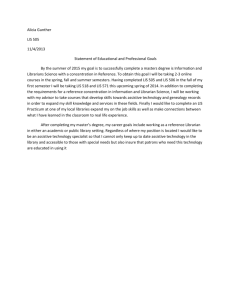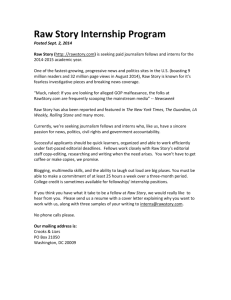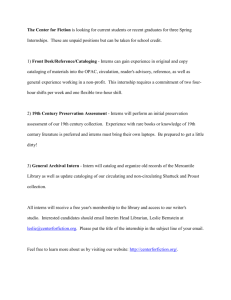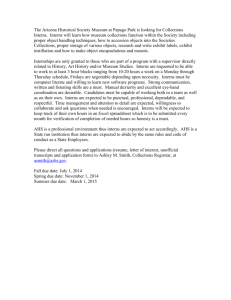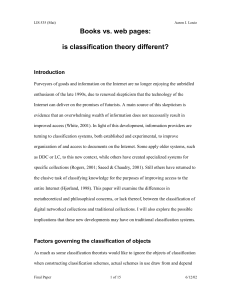Fieldwork final report
advertisement
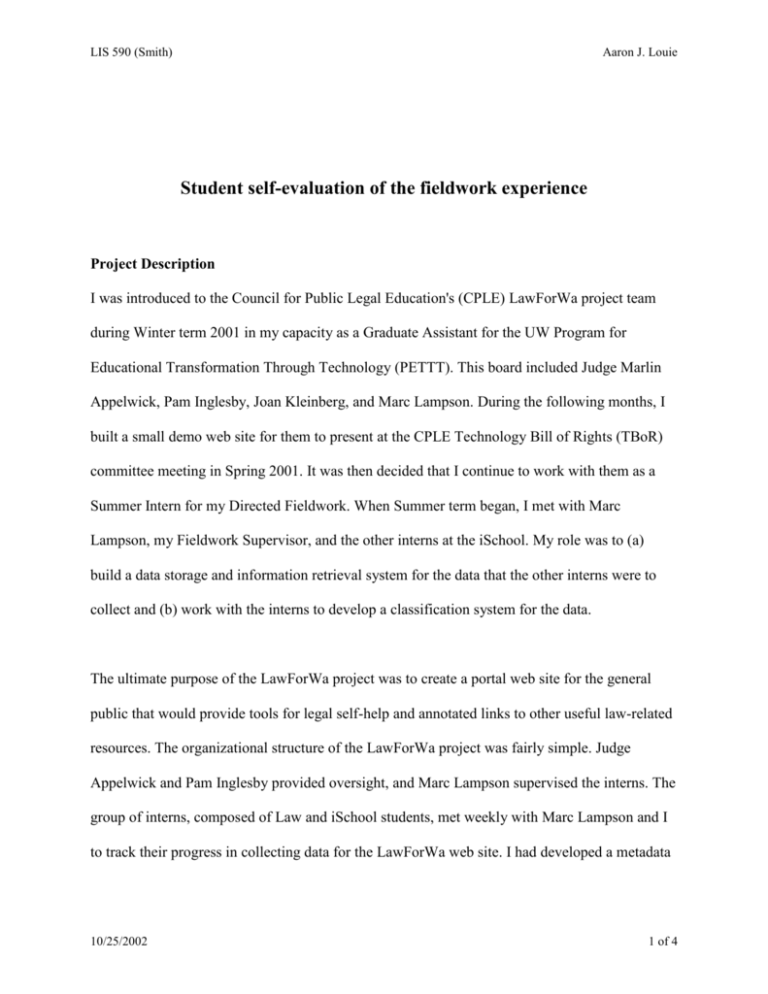
LIS 590 (Smith) Aaron J. Louie Student self-evaluation of the fieldwork experience Project Description I was introduced to the Council for Public Legal Education's (CPLE) LawForWa project team during Winter term 2001 in my capacity as a Graduate Assistant for the UW Program for Educational Transformation Through Technology (PETTT). This board included Judge Marlin Appelwick, Pam Inglesby, Joan Kleinberg, and Marc Lampson. During the following months, I built a small demo web site for them to present at the CPLE Technology Bill of Rights (TBoR) committee meeting in Spring 2001. It was then decided that I continue to work with them as a Summer Intern for my Directed Fieldwork. When Summer term began, I met with Marc Lampson, my Fieldwork Supervisor, and the other interns at the iSchool. My role was to (a) build a data storage and information retrieval system for the data that the other interns were to collect and (b) work with the interns to develop a classification system for the data. The ultimate purpose of the LawForWa project was to create a portal web site for the general public that would provide tools for legal self-help and annotated links to other useful law-related resources. The organizational structure of the LawForWa project was fairly simple. Judge Appelwick and Pam Inglesby provided oversight, and Marc Lampson supervised the interns. The group of interns, composed of Law and iSchool students, met weekly with Marc Lampson and I to track their progress in collecting data for the LawForWa web site. I had developed a metadata 10/25/2002 1 of 4 LIS 590 (Smith) Aaron J. Louie schema for the project, so I led a couple of these meetings to cover how the data they gathered should be organized and described. Expectations I originally set out to create the system using the tools I had developed for PETTT. These tools were built using a content management system called Zope, an object-oriented platform for developing web applications. I had already created objects & methods to hold and manage the data that the other interns would be collecting, so I planned to concentrate my efforts on writing scripts to upload, categorize, and search the data. In the meantime, I recommended that the interns collect the data in Excel spreadsheets while these scripts were being written. Unfortunately, events did not turn out as I had expected. As the interns collected data in the spreadsheets, it became apparent that there were many inconsistencies in the data, even though I had provided them with formatting rules and guidelines. They followed these guidelines for the most part, but I spent far too much time cleaning up after them. Finally, by the end of the summer, I had everything in place. All the methods for uploading, managing, and searching the data were written. All the data was formatted and ready to upload. However, when I began the upload process, the Zope server kept crashing. After several failed attempts, I realized that the system was overloaded by the amount of records I was storing, and that the entire data storage system needed to be redesigned. At this point, I conceded defeat and reported to the LawForWa team that I had to go back to the drawing board. Fortunately, they decided to re-work their timeline to do some user analysis and information architecture offline and gave me another month to rebuild the database. So, during the last few weeks, I worked with the PETTT database 10/25/2002 2 of 4 LIS 590 (Smith) Aaron J. Louie developer to design a relational (not object-oriented) database that would scale to accommodate all the data in the LawForWa project. At time of writing, the retrieval and categorization systems have not been connected to the database, but all the components are there. My personal feeling is that I performed to the best of my abilities, given the circumstances. I wish that there had been more direction and support from Marc (as a project manager) and the management (in terms of staffing), but I recognize that I could have been more proactive in asking for help. I completed all my tasks on schedule, even though the system did not scale and needed to be redesigned. My work with the other interns went well, I think. I feel that I communicated effective the concepts and needs for the formatting and organization of the data, but we may have benefited from meeting more frequently for working sessions. Coursework The majority of my coursework supported me in this experience, especially those courses dealing with systems design and architecture, knowledge organization, and programming – specifically, LIS 530, LIS 535, LIS 540, LIS 598B (Designing XML Metadata Schemas), CSE 142, and CSE 143. Some courses that could have helped (if I had taken them) are those in systems analysis, information architecture, database design, and project management. However, I believe my grounding in classification theory and systems design was extremely useful. I utilized the concepts of faceted classification and classification theory from LIS 530 as an approach to the design of the data model, which allowed for an extremely flexible content management strategy. Also essential were the concepts of metadata management and information retrieval system design from LIS 540. 10/25/2002 3 of 4 LIS 590 (Smith) Aaron J. Louie Conclusion In all, I believe that this learning experience was extremely valuable and that, despite the roadblocks I encountered, that I accomplished my learning objectives. I have definitely come away with a better understanding of the systems design process and valuable lessons in the caveats of information architecture, scalability, and project management. I am very glad to have had this experience through the Directed Fieldwork program, especially since many of the lessons learned may not have been acceptable in a professional context. I think the Directed Fieldwork program is an excellent opportunity for students like me to learn through trial and error in the “real world” before graduation, and I’m happy to have participated in it! 10/25/2002 4 of 4
